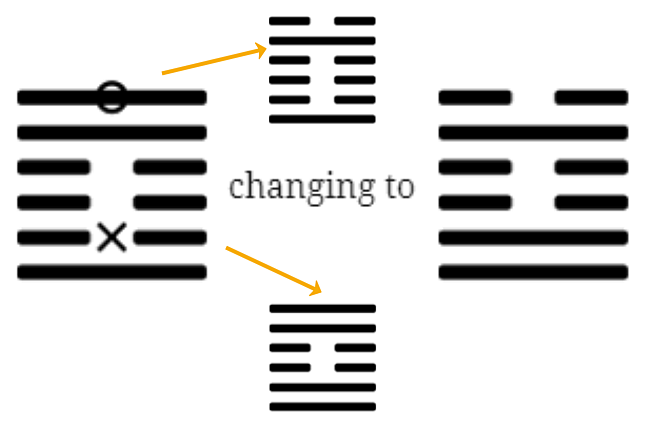Examples
22:5
‘Beauty in a hilltop garden. A roll of silk: small, so small. Shame. In the end, good fortune.’
37.5
‘With the king’s presence, there is a home. Do not worry. Good fortune.’
The shame you feel when your contribution is so small – where does that come from? Perhaps from a feeling of responsibility: the king ought to be able to guarantee security and plenty for everyone within this space. Or if you cast 37.5 – why might you be worried? Perhaps because of fears you can’t contribute enough. I cast 22.5 in March 2020, asking for advice on running the local Stroke Club during the pandemic. “We can’t have no Club until July,” I wrote, feeling a huge responsibility to provide for these people. Well… you know how that turned out. Weekly online meetings are not as good a ‘home’ as meeting in person, but they’re a whole lot better than nothing.
40.1
‘No mistake.’
That’s clear enough, but why might we think there was a mistake? 54.1
‘Maiden marries as a younger sister. Lame, can still walk. Setting out to bring order: good fortune.’
Because we’re at a disadvantage, because we’re limping, though we can still make progress.
20.6
‘Seeing their lives. The noble one is without mistake.’
You can read that within its own terms: the noble one, contemplating from a distance, keeping out of trouble. But what kind of trouble might you expect? 8.6
‘Seeking union without a head. Pitfall.’
If you receive 20.6, you might well imagine that not having a clear intention, not taking the lead, would be a problem – as it was for Fang Feng, who was decapitated by Yu the Great. If you received 8.6, you might be tempted to adopt that disengaged, distanced view of 20.6 to keep your nose clean. I’ve included this last example because, in both cases, you’d be wrong to believe the fan yao. This is by no means always true: the emotional connection of the fan yao might show a misconception or misleading impression, or it might directly support your understanding of the line by adding a kind of background wisdom. The key is to keep it in context, and not give it too much importance. I gave the fan yao a special ‘health warning’ because it can give such an accurate reflection of what you believe or feel that it’s easy to accept it uncritically – and sometimes tempting to treat it as the answer in preference to the line cast.
A couple more examples of the unwisdom of this:
46.4
‘The king makes offerings on Mount Qi. Good fortune, no mistake.’
32.4
‘In the field, no game.’
Looking just at the text, these two don’t seem related – but in practice, I’ve found 46.4 is often associated with not getting what you aspire to. A possible interpretation would be that ‘offerings on Mt Qi’, the Zhou’s ancestral mountain, are a way to reconnect with what endures (zhi gua 32) and is sacred – which is not necessarily your personal project. That’s good fortune, even if you don’t think so. At 32.4, you may feel as though you are doing something of enduring sacred importance – and perhaps you are – but that doesn’t alter the fact that what you’re looking for isn’t available where you’ve chosen to look. At 46.4, you may feel as though you’re not getting anywhere, but in fact this offering you are making has a deeper and more lasting significance.
27.6
‘Origin of nourishment. Danger, good fortune. Fruitful to cross the great river.’
24.6
‘Confused return, pitfall. There is calamity and blunder. Using this to mobilise the armies: in the end there is great defeat. For your state’s leader, disaster. For ten years, incapable of marching out.’
Why would you make the calamitous blunder of 24.6? Perhaps because you imagine the ‘origin of nourishment’ is within your grasp, that you can recapture it by braving the danger and committing yourself irrevocably. In other words, if you imagine you are at 27.6. At 27.6, you are aware of how precarious your position is, and perhaps afraid of 24.6’s kind of disaster – self-sabotage, self-destruction. But you are at the origin of nourishment, and should not be discouraged.
And conversely, here’s an example of a fan yao contributing a voice of wisdom:
26.1
‘There is danger. Fruitful to stop it.’
Really? Why? What danger? How do I know what to stop? 18.1
‘Ancestral father’s corruption. There is a child, The deceased elders are without fault. Danger. In the end, good fortune.’
Here, the fan yao actually identifies a danger: that of bearing the ancestors’ corruption. ‘Stopping it’ will mean crossing the river (in the oracle text of both hexagrams), going orthogonal to the flow and breaking the pattern.












